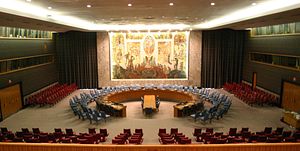On Saturday, the United Nations Security Council voted unanimously to adopt a new sanctions resolution against North Korea following the country’s tests of two intercontinental-range ballistic missiles in July.
The sanctions are among the widest-ranging to date at the United Nations and seek to cut off North Korean exports across several industries, including coal, iron ore, lead, lead ore, and seafood.
Previous resolutions had allowed limited exports in these categories. U.S. officials note that the resolution could cost North Korea up to $1 billion a year in lost revenue if implemented fully.
The resolution (S/RES/2371) was passed unanimously, with China and Russia voting for its passage. Moscow had notably expressed skepticism regarding the facts of North Korea’s July 4 and July 28 launches, arguing that both ballistic missiles were not intercontinental-range missiles, but much shorter-range systems.
The resolution also expressed concern about North Korea’s chemical weapons arsenal, calling on it to accede to the Convention on the Prohibition of Chemical Weapons. North Korea deployed VX nerve agent earlier this year in Kuala Lumpur International Airport to assassinate Kim Jong-nam, North Korean leader Kim Jong-un’s older half-brother.
The Trump administration is treating the passage of the resolution as a victory for its policy of pursuing maximum pressure against North Korea. The sanctions intensify two previous rounds of UN Security Council sanctions put in place last year after North Korea’s fourth and fifth nuclear tests respectively.
However, as with most UN Security Council sanctions against North Korea, implementation will likely continue to be a challenge, with member states falling behind on notification requirements. While North Korea will likely lose out on additional export revenue, it may not lose nearly as much as $1 billion a year without sufficient implementation from UN member states, chief among them China, which accounts for more than 85 percent of all of North Korea’s trade.
In addition to a new round of sanctions, the Security Council resolution adopted Saturday also added several North Korean officials to a travel ban list and also froze their assets. It additionally designated various North Korean entities for an asset freeze.
The passage of this resolution could delay any decision by the United States to move forward with a unilateral regime of secondary sanctions against entities and individuals — primarily in China and Russia — accused of facilitating North Korea’s ballistic missile and nuclear program.
Both Beijing and Moscow, in the end, may have acquiesced to Saturday’s resolution to forestall such a decision by the Trump administration, which has been considering secondary sanctions since it began a policy review on North Korea earlier this year.

































